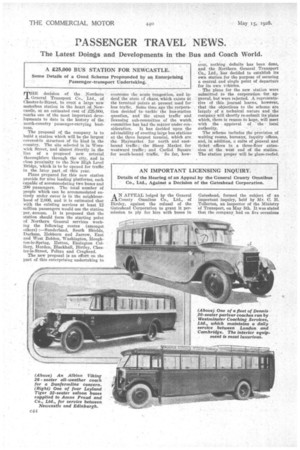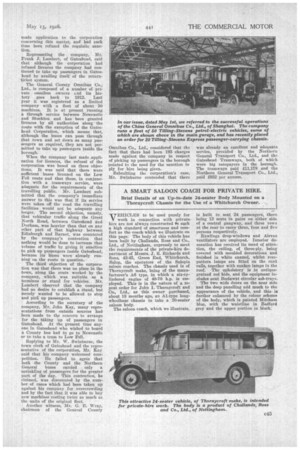AN IMPORTANT LICENSING INQUIRY.
Page 66

Page 67

If you've noticed an error in this article please click here to report it so we can fix it.
Details of the Hearing of an Appeal by the General County Omnibus Co., Ltd., Against a Decision of the Gateshead Corporation. .. .
AN APPEAL lodged by the General County Omnibus Co., Ltd., of Birtley, against the refusal of the Gateshead Corporation to grant it permission to ply for hire with buses in Gateshead, formed the subject of an important inquiry, held by Mr. C. H. Tollerton, an inspector of the Ministry of Transport, on May 8th. It was stated that the company, had on five occasions
made application to the corporation concerning this matter, and had each time been refused the requisite sanction.
Representing the company, Mr. Frank J. Lambert, of Gateshead, said that although thecorporation had
refused licences the thehad continued to take up passengers in Gateshead by availing itself of the return-ticket system.
The General Cotmty Omnibus Co., Ltd., is composed of a number of private omnibus owners end its history goes back to 1912. Last year it was registered as a limited company with a fleet of about 30 machines. It is at present running a through service between Newcastle and Stockton and has been granted licenees by all authorities along the route with the exception of the Gateshead Corporation, which means that, although the buses can pass through that town and set down as many passengers as required, they are not permitted to take up passengers inside the borough.
When the company last made application for licences, the refusal of the corporation was based on three objections. It was said that there were Sufficient buses licensed on the Low Fell route and that these, in conjunction with a tramways service, were adequate for the requirements of the travelling public. Mr. Lambert submitted that the company's immediate answer to this was that if its service were taken off the road the travelling facilities would not be adequate any longer. The second objection, namely, that vehicular traffic along the Great North Road, between Gateshead and Durham, was heavier than that on any other part of that highway between Edinburgh and Barnet, was countered by the company's contention that nothing would be done to increase that volume of traffic by giving it sanctionto pick up passengers inside Gateshead; because its Mises were already running-on the route in question.
The third objection of the corporation was that there was no place in the town, along the route worked by the company, which was suitable as a terminus or stand for vehicles. Mr. Lambert observed that the company had no desire to establish a titan& but merely wanted to be allowed to stop and pick up passengers.
According to the secretary of the company, Mr. John Kay, many representations from outside sources had been made to the concern to arrange for the taking up of passengers in Gateshead. At the present time anyone in Gateshead who wished to hoard a County bus had to go to Newcastle or to take a tram to Low Fell.
Replying to Mr. W. Swinburne, the town clerk of Gateshead and the representative of the corporation, Mr. Kay said that his company welcomed competition. He failed to agree that both the County and the Northern General buses carried only a sprinkling of passengers for the greater part of the day. This contention, he claimed, was discounted by the number of cases which had been taken up against his company for .overcrowding and by the fact that it was able to buy new machines costing twice as much as the units of the original fleet.
Another witness, Mr. G. E. Wray, chairman of the General County Omnibus Co., Ltd., considered that the fact that there had been 193 charges made against the company in respect of picking up passengers in the borough pointed to the need for the sanction to ply for hire being given.
Submitting the corporation's case, Mr. Swinburne contended that there
was already an excellent and adequate service provided by the Northern General Transport Co., Ltd., and the Gateshead Tramways, both of which. were big ratepayers in the borough. The tramways paid £11,178 and the Northern General Transport Co., Ltd., paid £952 per annum.












































































































